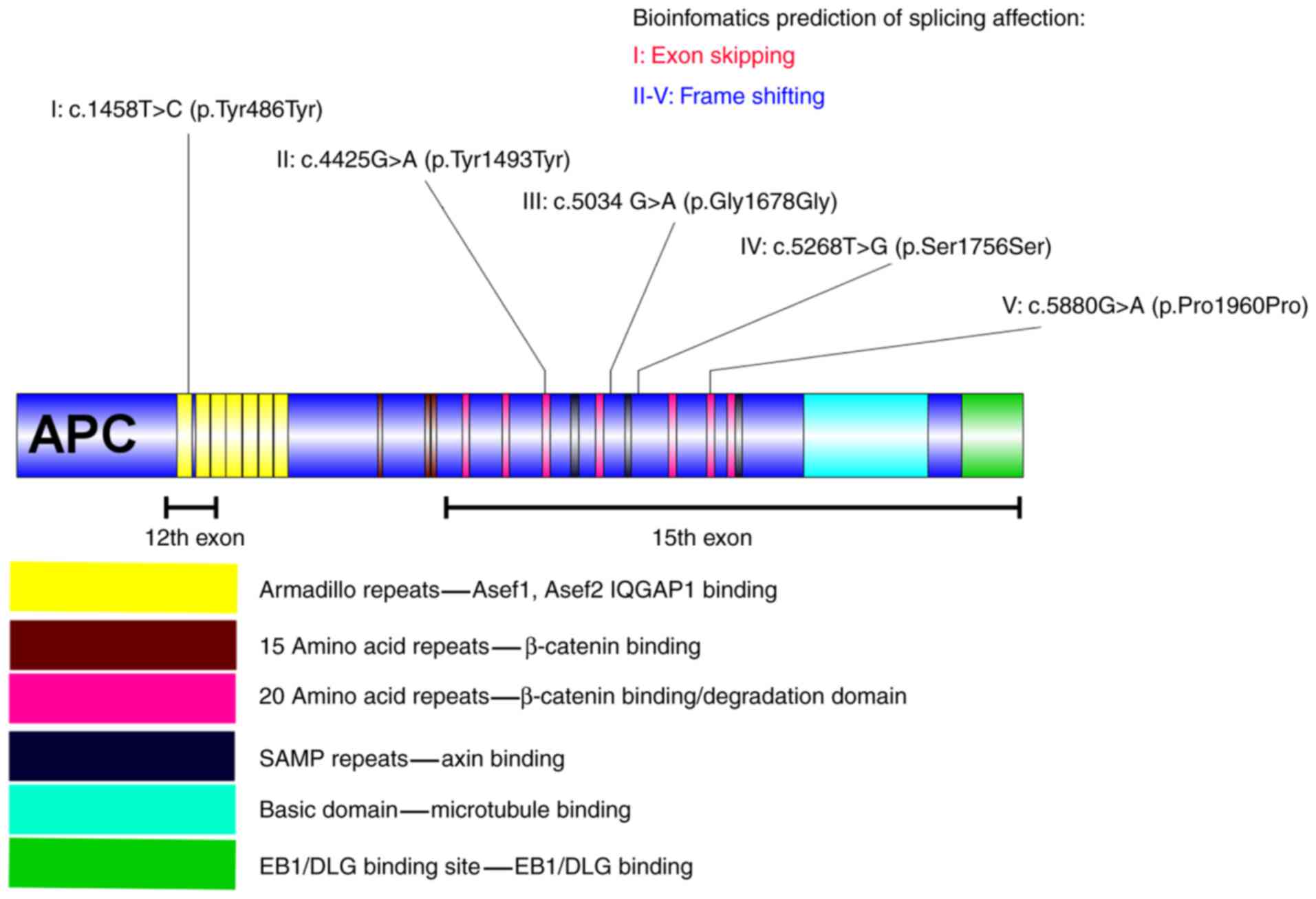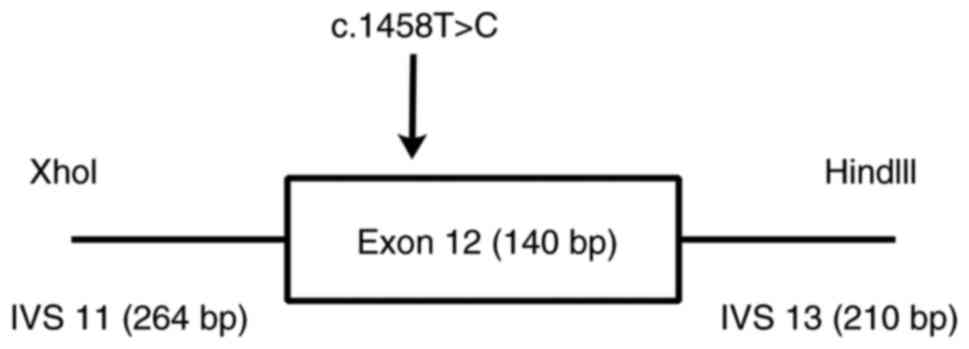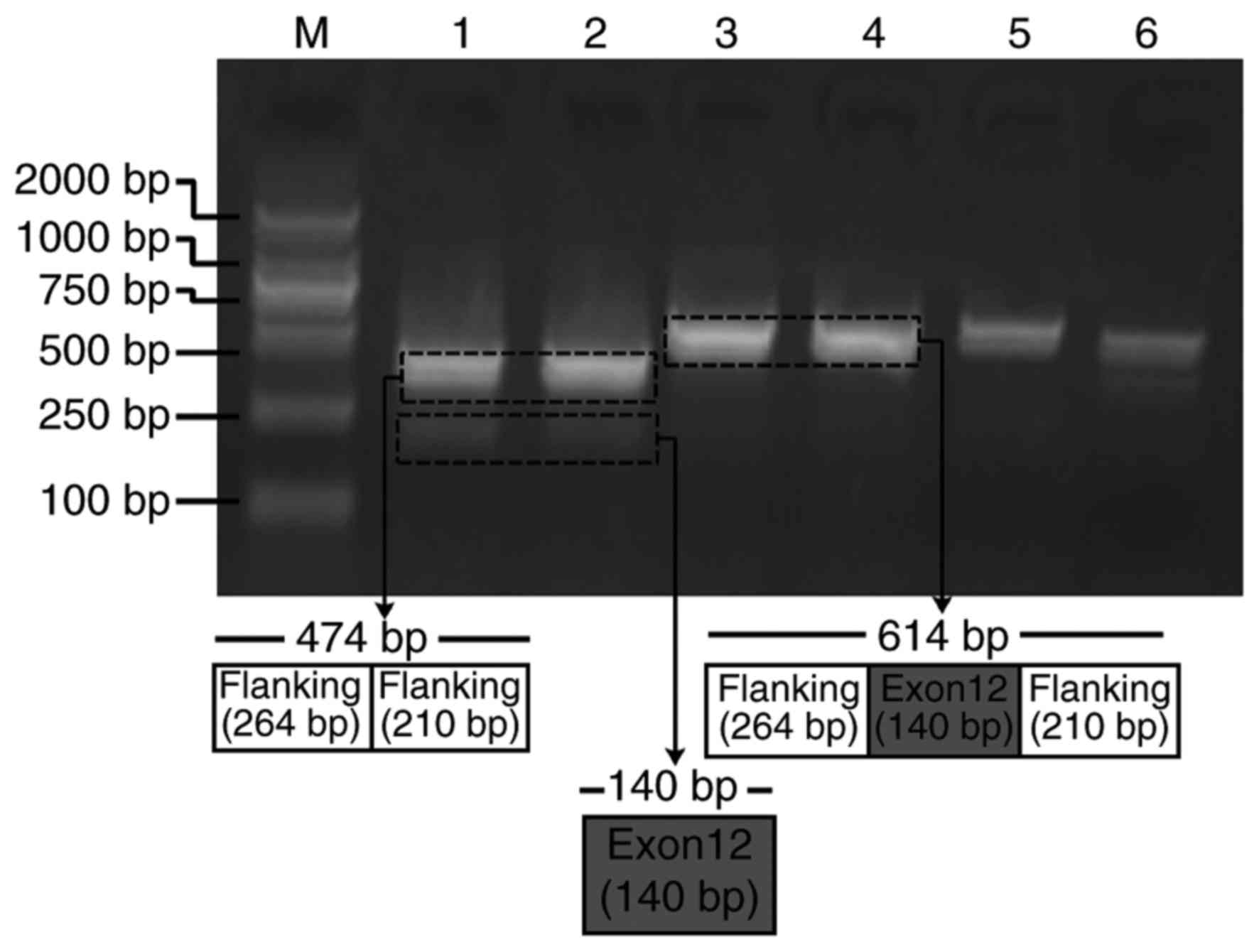|
1
|
Gardner EJ, Burt RW and Freston JW:
Gastrointestinal polyposis: Syndromesand genetic mechanisms. West J
Med. 132:488–499. 1980.PubMed/NCBI
|
|
2
|
Kanth P, Grimmett J, Champine M, Burt R
and Samadder NJ: Hereditary colorectal polyposis and cancer
syndromes: A primer on diagnosis and management. Am J
Gastroenterol. 112:1509–1525. 2017. View Article : Google Scholar : PubMed/NCBI
|
|
3
|
Kinzler KW, Nilbert MC, Vogelstein B,
Bryan TM, Levy DB, Smith KJ, Preisinger AC, Hamilton SR, Hedge P,
Markham A, et al: Identification of a gene located at chromosome
5q21 that is mutated in colorectal cancers. Science. 251:1366–1370.
1991. View Article : Google Scholar : PubMed/NCBI
|
|
4
|
Groden J, Thliveris A, Samowitz W, Carlson
M, Gelbert L, Albertsen H, Joslyn G, Stevens J, Spirio L, Robertson
M, et al: Identification and characterization of the familial
adenomatous polyposis coligene. Cell. 66:589–600. 1991. View Article : Google Scholar : PubMed/NCBI
|
|
5
|
Syngal S, Brand RE, Church JM, Giardiello
FM, Hampel HL and Burt RW; American College of Gastroenterology, :
ACG clinical guideline: Genetic testing and management of
hereditary gastrointestinal cancer syndromes. Am J Gastroenterol.
110:223–262. 2015. View Article : Google Scholar : PubMed/NCBI
|
|
6
|
Boman BM and Fields JZ: An APC: WNT
counter-current-like mechanism regulates cell division along the
human colonic crypt Axis: A mechanism that explains how APC
mutations induce proliferative abnormalities that drive colon
cancer development. Front Oncol. 3:2442013. View Article : Google Scholar : PubMed/NCBI
|
|
7
|
Al-Tassan N, Chmiel NH, Maynard J, Fleming
N, Livingston AL, Williams GT, Hodges AK, Davies DR, David SS,
Sampson JR and Cheadle JP: Inherited variants of MYH associated
with somatic G:C->T: A mutations in colorectal tumors. Nat
Genet. 30:227–232. 2002. View
Article : Google Scholar : PubMed/NCBI
|
|
8
|
Renkonen ET, Nieminen P, Abdel-Rahman WM,
Moisio AL, Järvelä I, Arte S, Järvinen HJ and Peltomäki P:
Adenomatous polyposis families that screen APC mutation-negative by
conventional methods are genetically heterogeneous. J Clin Oncol.
23:5651–5659. 2005. View Article : Google Scholar : PubMed/NCBI
|
|
9
|
Sieber OM, Lipton L, Crabtree M, Heinimann
K, Fidalgo P, Phillips RK, Bisgaard ML, Orntoft TF, Aaltonen LA,
Hodgson SV, et al: Multiple colorectal adenomas, classic
adenomatous polyposis, and germ-line mutations in MYH. N Engl J
Med. 348:791–799. 2003. View Article : Google Scholar : PubMed/NCBI
|
|
10
|
Ricci MT, Salemme M, Villanacci V and
Varesco L: The genetics of inherited predispositions to colorectal
polyps: A quick guide for clinicians. Colorectal Dis. 17 Suppl
1:S3–S9. 2015. View Article : Google Scholar
|
|
11
|
Wei SC, Su YN, Tsai-Wu JJ, Wu CH, Huang
YL, Sheu JC, Wang CY and Wong JM: Genetic analysis of the APC gene
in Taiwanese familial adenomatous polyposis. J Biomed Sci.
11:260–265. 2004. View Article : Google Scholar : PubMed/NCBI
|
|
12
|
Prior TW and Bridgeman SJ: Identifying
mutations for MYH-associated polyposis. Curr Protoc Hum Genet
Chapter. 10:Unit 10.13. 2010. View Article : Google Scholar
|
|
13
|
Yang J, Liu WQ, Li WL, Chen C, Zhu Z, Hong
M, Wang ZQ and Dong J: Investigating polymorphisms by
bioinformatics is a potential cost-effective method to screen for
germline mutations in Chinese familial adenomatous polyposis
patients. Oncol Lett. 12:421–428. 2016. View Article : Google Scholar : PubMed/NCBI
|
|
14
|
Sauna ZE and Kimchi-Sarfaty C:
Understanding the contribution of synonymous mutations to human
disease. Nat Rev Genet. 12:683–691. 2011. View Article : Google Scholar : PubMed/NCBI
|
|
15
|
Plotkin JB and Kudla G: Synonymous but not
the same: The causes and consequences of codon bias. Nat Rev Genet.
12:32–42. 2011. View
Article : Google Scholar : PubMed/NCBI
|
|
16
|
Supek F, Miñana B, Valcárcel J, Gabaldón T
and Lehner B: Synonymous mutations frequently act as driver
mutations in human cancers. Cell. 156:1324–1335. 2014. View Article : Google Scholar : PubMed/NCBI
|
|
17
|
Chiang JM, Chen HW, Tang RP, Chen JS,
Changchien CR, Hsieh PS and Wang JY: Mutation analysis of the APC
gene in Taiwanese FAP families: Low incidence of APC germline
mutation in a distinct subgroup of FAP families. Fam Cancer.
9:117–124. 2010. View Article : Google Scholar : PubMed/NCBI
|
|
18
|
Minton JA, Flanagan SE and Ellard S:
Mutation surveyor: Software for DNA sequence analysis. Methods Mol
Biol. 688:143–153. 2011. View Article : Google Scholar : PubMed/NCBI
|
|
19
|
Stenson PD, Mort M, Ball EV, Shaw K,
Phillips A and Cooper DN: The human gene mutation database:
Building a comprehensive mutation repository for clinical and
molecular genetics, diagnostic testing and personalized genomic
medicine. Hum Genet. 133:1–9. 2014. View Article : Google Scholar : PubMed/NCBI
|
|
20
|
Thorisson GA, Smith AV, Krishnan L and
Stein LD: The International HapMap project web site. Genome Res.
15:1592–1593. 2005. View Article : Google Scholar : PubMed/NCBI
|
|
21
|
Sherry ST, Ward MH, Kholodov M, Baker J,
Phan L, Smigielski EM and Sirotkin K: dbSNP: The NCBI database of
genetic variation. Nucleic Acids Res. 29:308–311. 2001. View Article : Google Scholar : PubMed/NCBI
|
|
22
|
Zerbino DR, Achuthan P, Akanni W, Amode
MR, Barrell D, Bhai J, Billis K, Cummins C, Gall A, Girón CG, et
al: Ensembl 2018. Nucleic Acids Res. 46:(Database issue).
D754–D761. 2018. View Article : Google Scholar : PubMed/NCBI
|
|
23
|
Pan M, Cong P, Wang Y, Lin C, Yuan Y, Dong
J, Banerjee S, Zhang T, Chen Y, Zhang T, et al: Novel LOVD
databases for hereditary breast cancer and colorectal cancer genes
in the Chinese population. Hum Mutat. 32:1335–1340. 2011.
View Article : Google Scholar : PubMed/NCBI
|
|
24
|
Ramensky V, Bork P and Sunyaev S: Human
non-synonymous SNPs: Server and survey. Nucleic Acids Res.
30:3894–900. 2002. View Article : Google Scholar : PubMed/NCBI
|
|
25
|
Ng PC and Henikoff S: Predicting
deleterious amino acid substitutions. Genome Res. 11:863–874. 2001.
View Article : Google Scholar : PubMed/NCBI
|
|
26
|
Capriotti E, Calabrese R, Fariselli P,
Martelli PL, Altman RB and Casadio R: WS-SNPs&GO: A web server
for predicting the deleterious effect of human protein variants
using functional annotation. BMC Genomics. 14 Suppl 3:S62013.
View Article : Google Scholar : PubMed/NCBI
|
|
27
|
Cartegni L, Wang J, Zhu Z, Zhang MQ and
Krainer AR: ESEfinder: A web resource to identify exonic splicing
enhancers. Nucleic Acids Res. 31:3568–3571. 2003. View Article : Google Scholar : PubMed/NCBI
|
|
28
|
Yeo G and Burge CB: Variation in sequence
and organization of splicing regulatory elements in vertebrate
genes. In the Proceeding of Proc. Natl Acad Sci. 101:15700–15705.
2004. View Article : Google Scholar
|
|
29
|
Fairbrother WG, Yeh RF, Sharp PA and Burge
CB: Predictive identification of exonic splicing enhancers in human
genes. Science. 297:1007–1013. 2002. View Article : Google Scholar : PubMed/NCBI
|
|
30
|
Cooper TA: Use of minigene systems to
dissect alternative splicing elements. Methods. 37:331–340. 2005.
View Article : Google Scholar : PubMed/NCBI
|
|
31
|
Gómez-Fernández N, Castellví-Bel S,
Fernández-Rozadilla C, Balaguer F, Muñoz J, Madrigal I, Milà M,
Graña B, Vega A, Castells A, et al: Molecular analysis of the APC
and MUTYH genes in Galician and Catalonian FAP families: A
different spectrum of mutations? BMC Med Genet. 10:572009.
View Article : Google Scholar : PubMed/NCBI
|
|
32
|
Kashfi SM, Farahbakhsh Behboudi F,
Golmohammadi M, Mojarad Nazemalhosseini E, Azimzadeh P and Aghdaie
Asadzadeh H: Frameshift mutations (deletion at codon 1309 and codon
849) in the APC gene in iranian FAP patients: A c series and review
of the literature. Int J Mol Cell Med. 3:196–202. 2014.PubMed/NCBI
|
|
33
|
Mohamed Z, Ahmad R, Yoke NS, Zakaria Z,
Ahmad H and Yew TH: A nonsense mutation in exon 8 of the APC gene
(Arg283Ter) causes clinically variable FAP in a Malaysian Chinese
family. Cancer Sci. 94:725–728. 2003. View Article : Google Scholar : PubMed/NCBI
|
|
34
|
Yang J, Liu QW, Li LW, Wang QZ, Hong M and
Dong J: Familial adenomatous polyposis in China. Oncol Lett.
12:4877–4882. 2016. View Article : Google Scholar : PubMed/NCBI
|
|
35
|
Menéndez M, González S, Obrador-Hevia A,
Domínguez A, Pujol MJ, Valls J, Canela N, Blanco I, Torres A,
Pineda-Lucena A, et al: Functional characterization of the novel
APC N1026S variant associated with attenuated familial adenomatous
polyposis. Gastroenterology. 134:56–64. 2008. View Article : Google Scholar : PubMed/NCBI
|
|
36
|
Sucularli C and Arslantas M: Computational
prediction and analysis of deleterious cancer associated missense
mutations in DYNC1H1. Mol Cell Probes. 34:21–29. 2017. View Article : Google Scholar : PubMed/NCBI
|
|
37
|
Kimchi-Sarfaty C, Oh JM, Kim IW, Sauna ZE,
Calcagno AM, Ambudkar SV and Gottesman MM: A ‘silent’ polymorphism
in the MDR1 gene changes substrate specificity. Science.
315:525–528. 2007. View Article : Google Scholar : PubMed/NCBI
|
|
38
|
Park SL, Bastani D, Goldstein BY, Chang
SC, Cozen W, Cai L, Cordon-Cardo C, Ding B, Greenland S, He N, et
al: Associations between NBS1 polymorphisms, haplotypes and
smoking-related cancers. Carcinogenesis. 31:1264–1271. 2010.
View Article : Google Scholar : PubMed/NCBI
|
|
39
|
Liang J, Jiang T, Yao RY, Liu ZM, Lv HY
and Qi WW: The combination of ERCC1 and XRCC1 gene polymorphisms
better predicts clinical outcome to oxaliplatin-based chemotherapy
in metastatic colorectal cancer. Cancer Chemother Pharmacol.
66:493–500. 2010. View Article : Google Scholar : PubMed/NCBI
|
|
40
|
Ernst T, Hoffmann J, Erben P, Hanfstein B,
Leitner A, Hehlmann R, Hochhaus A and Müller MC: ABL single
nucleotide polymorphisms may masquerade as BCR-ABL mutations
associated with resistance to tyrosine kinase inhibitors in
patients with chronic myeloid leukemia. Haematologica.
93:1389–1393. 2008. View Article : Google Scholar : PubMed/NCBI
|
|
41
|
Ma F, Sun T, Shi Y, Yu D, Tan W, Yang M,
Wu C, Chu D, Sun Y, Xu B and Lin D: Polymorphisms of EGFR predict
clinical outcome in advanced non-small-cell lung cancer patients
treated with Gefitinib. Lung Cancer. 66:114–119. 2009. View Article : Google Scholar : PubMed/NCBI
|
|
42
|
Fung KL and Gottesman MM: A synonymous
polymorphism in a common MDR1 (ABCB1) haplotype shapes protein
function. Biochim Biophys Acta. 1794:860–871. 2009. View Article : Google Scholar : PubMed/NCBI
|


















